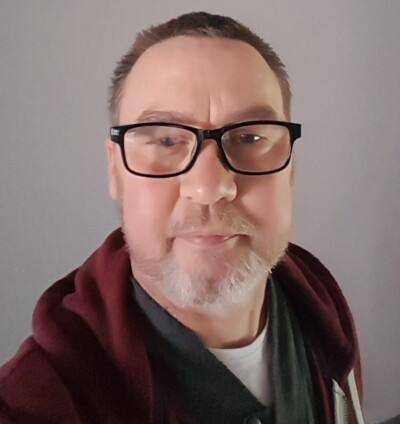 My name is Simon Gach and I have XLA (X-linked agammaglobulinemia). The condition means that my pre-B cells do not mature, so I have no natural resistance to certain bacterial infections, especially pneumonia-type conditions.
My name is Simon Gach and I have XLA (X-linked agammaglobulinemia). The condition means that my pre-B cells do not mature, so I have no natural resistance to certain bacterial infections, especially pneumonia-type conditions.
I was born in 1961 to a Polish father and an English mother. I was the second child; my brother was born in 1959
When my brother was 18 months old, he was admitted to hospital with an undiagnosed infection. He was put beside a child with polio, which he caught, and was subsequently paralysed from the waist down. After running tests, the doctors discovered that my brother had no immunoglobulin G and diagnosed what was called Bruton’s hypogammaglobulinemia (now better known as agammaglobulinemia). When I was born two years later, in 1961, I was immediately tested and found to have the same condition.
My journey to diagnosis started from birth, as did my intramuscular treatment of gamma globulin
It must have been very difficult for my mother, who had to cope with two very sick babies. She was frequently backwards and forwards to various hospitals, and my brother and I were constantly ill. This was in the days when the treatment for XLA was in its infancy. There weren’t many medical experts around at that time.
We were lucky because our local hospital had an immunologist who was very knowledgeable on the subject
My immunologist for more than 35 years was Dr David Webster, who started the Primary Immunodeficiency Association. He also treated my brother at the start of 1972, when Northwick Park Hospital was a research hospital and quite new.
It was hard growing up with the condition
The intramuscular injections were very painful. It wasn’t until the start of my teens that I had issues to do with feeling very different and wanting to do normal things, rather than having to work my life around doctors and hospitals. I was in and out of hospital constantly with chest infections and pneumonia.
XLA has affected my family since the 1920s and 1930s, when my grandmother gave birth to four boys and three girls. All four boys died before they were two years old. Of the three sisters, the youngest had two boys: one had XLA, the other didn’t. The middle sister had two boys – me and my brother. The older sister had one boy and one girl; neither affected by XLA.
At the age of seven I had a test using a dye medium; a test they stopped using owing to its toxicity
I was found to have damage to the bases of both my lungs. I had intense daily physio on my chest and I was on prophylactic antibiotics. My brother was on the same regime, so our lives revolved around hospitals and doctors and not much else.
My brother had meningitis and encephalitis and then echovirus
He died from this condition when he was 15. I was 13 at the time. Life was difficult as we were very close and had spent all our time together. From then on, my journey took a different path in that I became a very rebellious teenager. This meant that I didn’t get my treatments on time and I didn’t get enough sleep either.
The effect on us as a family was profound
My father left the family when I was five. He did not cope well with our illness and left my mother to cope by herself with no support. Then, losing my brother had a deep effect on us; something that we struggled with lifelong.
I left school at 15 and got a job, but at 19 years old I had sepsis and was hospitalised for several months
It was then that I met my first wife, who was a nurse assigned to me. I got back on track, making sure I had regular sleep and regular treatment. By the age of 25, I was father to a son and a daughter, both, thankfully, unaffected by XLA, as are their children.
At 55 years old, with my lungs ravaged by constant pleurisy and pneumonia, I received a double lung transplant
I am now four years post-surgery and my new lungs are working at 100% capacity. However, there is always a but. In my case, I am susceptible to norovirus, which I caught either in surgery or post-surgery. Combined with immunosuppressants, I cannot get rid of it. It has caused me some further major issues.
My advice for anyone starting their journey would be to ask questions and become knowledgeable about your condition. The more you know about it, the better you will understand your journey
Join support groups, such as Immunodeficiency UK, because they are a great source of knowledge and help. Having contact with people who can empathise with you is a great help.
Immunodeficiency UK has helped me because having a contact that knows what I am going through is an absolute gift
Immunodeficiency UK’s communications are both helpful and knowledgeable. I hope that my experiences are a valuable addition to the charity’s knowledge bank.
Posted November 2020





